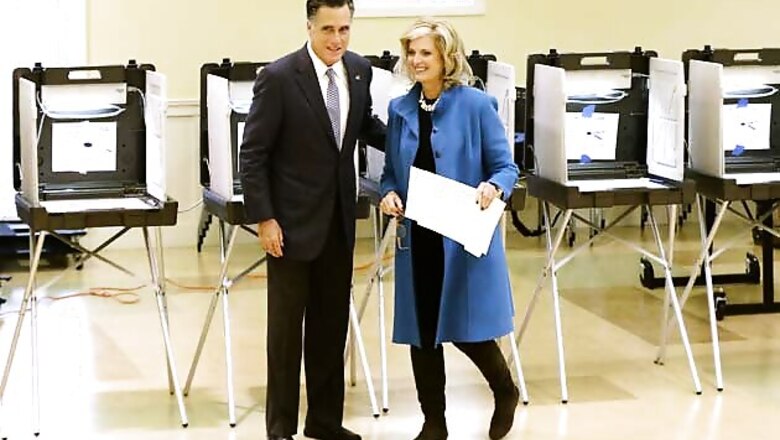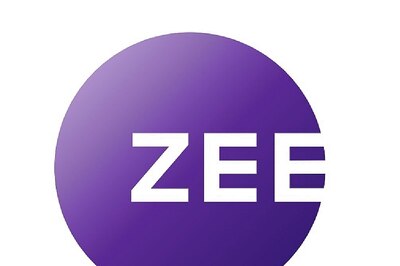
views
Washington: Capping a long and bitter race for the White House, Americans cast their votes on Tuesday with polls showing President Barack Obama and Republican challenger Mitt Romney neck-and-neck in an election that will be decided in a handful of states. Polling stations opened across the eastern United States and Midwest, with the West Coast soon to follow, as Election Day dawned. At least 120 million people were expected to render judgement on whether to give Obama a second term or replace him with Romney.
Their decision will set the country's course for the next four years on spending, taxes, healthcare and foreign policy challenges like the rise of China and Iran's nuclear ambitions. National opinion polls show Obama and Romney in a virtual dead heat, although the Democratic incumbent has a slight advantage in several vital swing states - most notably Ohio - that could give him the 270 electoral votes needed to win the state-by-state contest.
Romney, the multimillionaire former head of a private equity fund, would be the first Mormon president and one of the wealthiest Americans to occupy the White House. Obama, the first black president, is vying to be the first Democrat to win a second term since Bill Clinton in 1996. Whichever candidate wins, a razor-thin margin would not bode well for the clear mandate needed to break the partisan gridlock in Washington.
Romney voted at a community center near his home in a Boston suburb before dashing off for two last-minute stops, including the most critical of all swing states - Ohio. "I feel great about Ohio," he said when asked about what is considered a must-win for him.
Obama, settled into his home town of Chicago, made a final pitch to morning commuters with pre-recorded interviews broadcast in battleground states. "Four years ago, we had incredible turnout," Obama told a Miami radio station. "I know people were excited and energized about the prospect of making history but we have to preserve the gains we've made and keep moving forward."
Fueled by record spending on negative ads, the battle between the two men was focused primarily on the lagging economic recovery and persistent high unemployment, but at times it turned personal.
Boosting turnout
As Americans headed to voting booths, campaign teams for both candidates worked the phones feverishly to mobilize supporters to cast their ballots. Polls will begin to close in Indiana and Kentucky at 6 pm EST (1900 p.m EDT) on Tuesday, with voting ending across the country over the next six hours.
The first results, by tradition, were tallied in Dixville Notch and Hart's Location, New Hampshire, shortly after midnight (0100 a.m EDT). Obama and Romney each received five votes in Dixville Notch. In Hart's Location, Obama had 23 votes to nine for Romney and two for Libertarian candidate Gary Johnson.
The close presidential race raises the prospect of a disputed outcome similar to the 2000 election, which was decided by the US Supreme Court in favor of George W. Bush over Al Gore. Both the Romney and Obama campaigns have assembled legal teams to deal with possible voting problems, challenges or recounts.
The balance of power in the US Congress also will be at stake in Senate and House of Representatives races that could impact the outcome of "fiscal cliff" negotiations on spending cuts and tax increases, which kick in at the end of the year unless a deal is reached.
Obama's Democrats are now expected to narrowly hold their Senate majority, while Romney's Republicans are favored to retain House control. Amid uncertainty over the US election outcome, world stock markets and the dollar held steady on Tuesday as investors waited for the result.
Despite the weak economy, Obama appeared in September to be cruising to a relatively easy win after a strong party convention and a series of stumbles by Romney, including a secretly recorded video showing the Republican writing off 47 per cent of the electorate as government-dependent victims.
But Romney rebounded in the first debate on October 3 in Denver, where his sure-footed criticism of the president and Obama's listless response started a slow rise for Romney in polls. Obama seemed to regain his footing in recent days at the head of federal relief efforts for victims of superstorm Sandy in the New York-New Jersey area.
The presidential contest is now likely to be determined by voter turnout - specifically, what combination of Republicans, Democrats, white, minority, young, old and independent voters shows up at polling stations.
Weather could be a factor. Much of the nation was dry and mild, though rain was forecast later on Tuesday in the Southeast, including Florida, an important swing state.
Obama and Romney raced through seven battleground states on Monday to hammer home their final themes, urge supporters to get to the polls and woo the last remaining undecided voters.
'We know what change looks like'
Obama focused on Wisconsin, Ohio and Iowa, the three Midwestern swing states that, barring surprises elsewhere, would ensure that he reaches the 270 electoral votes needed to win. Romney visited the must-win states of Florida, Virginia and Ohio before finishing in New Hampshire.
After two days of nearly around-the-clock travel, Obama wrapped up his final campaign tour in Des Moines, Iowa, with a speech that hearkened back to his 2008 campaign.
"I came back to ask you to help us finish what we've started because this is where our movement for change began," he told a crowd of some 20,000 people. Obama wiped away tears as he reflected on those who had helped his campaign.
Romney, former governor of Massachusetts, ended Monday in Manchester, New Hampshire, the city where he started his campaign last year. "We're one day away from a fresh start," the hoarse-sounding candidate told a crowd of 12,000.
Obama ridiculed Romney's claims to be the candidate of change and said the challenger would be a rubber stamp for a conservative Tea Party agenda. "We know what change looks like, and what he's selling ain't it," he said in Columbus, Ohio.
Romney argued he was the candidate who could break the partisan gridlock in Washington, and said four more years of Obama could mean another economic recession.
The common denominator for both candidates was Ohio. Without the state's 18 electoral votes, the path to victory becomes very narrow for Romney.
Polls have shown Obama with a small but steady lead in the state for months, sparked in part by his support for a federal bailout of the auto industry, which accounts for one of every eight jobs in Ohio, and by a strong state economy with an unemployment rate lower than the 7.9 per cent national rate.
That undercut the central argument of Romney's campaign - that his business experience made him uniquely qualified to create jobs and lead an economic recovery. Romney's aides hoped an 11th-hour visit on Tuesday could also boost his cause in Pennsylvania, a Democratic-leaning state that he has tried to put in play in recent weeks.
Obama fought back through the summer with ads criticizing Romney's experience at the equity fund Bain Capital and portraying him as out of touch with ordinary Americans. That was part of a barrage of advertising in the most heavily contested battleground states from both candidates and their party allies, who raised a combined $2 billion.
The rise of "Super PACs," unaffiliated outside groups that can spend unlimited sums on behalf of candidates, also helped fuel the record spending on political ads.
Obama voted in October by taking advantage of early voting procedures. Vice President Joe Biden stood patiently in a long line Tuesday to cast his ballot in his home state of Delaware.
"Oh, I'm feeling pretty good," Biden said when asked if he had any prediction, according to a pool report.
Asked whether this would be the last time he would vote for himself, he said with a grin, "No, I don't think so." The 69-year-old former US senator, who twice ran unsuccessfully for the White House before becoming Obama's running mate, has not ruled out another run in 2016.




















Comments
0 comment